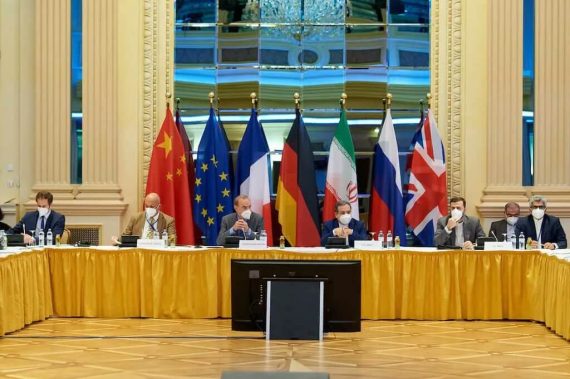On Tuesday, March 15, Russia’s Foreign Minister Sergey Lavrov confirmed the U.S. guarantee that would exempt Russia from sanctions limiting or preventing its economic and military-technical cooperation with Iran on accounts of its invasion of Ukraine, signaling the continuation of the nuclear talks.
After meeting with his Iranian counterpart Hossein Amir-Abdollahian, Lavrov stated at the press conference, “We received written guarantees. They are included in the text of the agreement itself on the resumption of the Joint Comprehensive Plan of Action (JCPOA) on the Iranian nuclear program.”
Amir-Abdollahian reaffirmed that Iran was a “strong and independent” actor who would not cease cooperation with any country upon pressure. He said that Russia would play a cooperative role in the talks, adding, “If we reach an agreement with the U.S. on remaining issues which relate to some of Iran’s main red lines, based on my talks with Mr. Lavrov today, Russia will remain beside the Islamic Republic of Iran until reaching a good and sustainable agreement, continuing to play the constructive role it has played since the start.”
Russia has been an important collaborator with Iran namely in Syria, while the JCPOA is set to change Iran’s capabilities in the region.
Time limitations
The Russian demand for written guarantees came on March 5, temporarily halting the nuclear negotiations with Iran. A tweet by Josep Borrell, high representative of the EU on foreign affairs and security policy, followed on March 18. Borrell wrote, “A pause in the Vienna talks is needed due to external factors. A final text is essentially ready and on the table.”
Saeed Khatibzadeh, Iran’s foreign ministry spokesperson, replied to Borrell’s tweet insisting that external factors would not affect the will to move ahead with a collective agreement and that a pause would be productive in solving outstanding issues.
Russia faced criticism from the E3 (France, Germany, and the UK) in a joint statement which accused it of exploiting JCPOA negotiations to secure assurances unrelated to the agreement, which Ned Price, the spokesperson for the U.S. State Department, said they endorsed.
Agreement on the Joint Comprehensive Plan of Action was first reached in July 2015 by Iran and the P5+1 (UK, U.S., France, China, Russia, and Germany). The purpose of the JCPOA was to limit and monitor Iran’s nuclear program to prevent the development of nuclear weapons in exchange for lifting the nuclear sanctions against Iran.
Donald Trump’s withdrawal from the nuclear deal
Despite Iran’s compliance, in May 2018, then U.S. president Donald Trump backed out of the deal and reinstated heavy sanctions against Iran, with his “maximum pressure” campaign citing Iran’s ballistic missile program among others. Iran remained compliant with the deal for another year until its first breach in May 2019 and since then has boosted its nuclear program.
Concerns about time sensitivity arise from the rapid growth of Iran’s nuclear advances, where the U.S. and its allies fear that a point of no return could be reached soon. In a board meeting of the UN nuclear watchdog on March 8, 2022, the U.S. articulated the urgency of the diplomatic efforts to revive the JCPOA. On Sunday, March 13, an Iranian missile strike in Iraq further stirred up the urgency.
U.S. seeks agreement after the missile strike on Erbil
During the hiatus in the Vienna talks, a missile attack, for which the Iranian Islamic Revolutionary Guard Corps (IRGC) claimed responsibility, shook Erbil, targeting what the IRGC alleged was an Israeli “strategic center.” The attack came after a threatening statement by the IRGC on Sepah News, the IRGC’s official website: “Any repetition of attacks by Israel will be met with a harsh, decisive, and destructive response.” The statement followed Iran’s announcement that two Revolutionary Guard officers were killed in Israeli air strikes in Syria.
As world governments condemned Iran for the attack, a statement by the French Foreign Ministry read, “Such actions jeopardize efforts to bring about a return to the Joint Comprehensive Plan of Action.” However, the latest developments regarding Russia’s guarantee that sanctions against it will not hurt Iran indicates that the United States is willing to proceed with the nuclear agreement.
In an interview with the talk show “Fox News Sunday,” U.S. Deputy Secretary of State Wendy Sherman addressed the claims that the strike was directed at the U.S. Consulate due to its proximity, saying they did not believe so. She also highlighted the importance the U.S. gives to preventing Iran from getting nuclear weapons.
Sherman stated, “If Iran has a nuclear weapon, its ability to project power into the Middle East and to deter us, our allies and partners, is enormous. So, President Biden believes very strongly, as does Secretary Blinken, as do I, that we need to make sure that Iran never obtains a nuclear weapon, and then we also need to deal with their malign behavior in the region. But first, we’ve got to make sure that they cannot obtain a nuclear weapon.”
Recommended
UAE and Israel grow wary of the possible revival of the JCPOA
Israel has been vocal about its opposition to the nuclear deal. Foreign Minister Yair Lapid met with Blinken in Latvia on March 7, during the meeting focusing on the war in Ukraine. Prior to the meeting, Lapid mentioned differences in opinion when it comes to the nuclear deal with Iran but underlined that it was a conversation with a common goal to prevent Iran from becoming a nuclear threshold country. Following the meeting, he said he found the nuclear agreement to be “bad and ineffective.”
Meanwhile, the Gulf Cooperation Council (GCC) has urged a return to the JCPOA, while some regional governments like the UAE are unenthusiastic about the sanctions being lifted. As the nuclear negotiations seem to be approaching a final agreement, both the UAE and Israel are concerned that the deal would make Iran more powerful with increased inflow of funds through the sale of oil and gas when sanctions against it are lifted.
At a time when both countries’ strategic partnerships with the U.S. seem to be taking a decline, the soaring oil prices caused by the war in Ukraine have given Israel and the UAE a new opportunity to discuss security guarantees with the U.S. On Monday, March 14, Bloomberg News reported that the UAE and Israel have asked the U.S. to provide them with security guarantees and to “formulate a security strategy for the Middle East” should the Iran nuclear deal be revived.
For Iran’s neighbors a search for new security strategies seems to be imminent.





